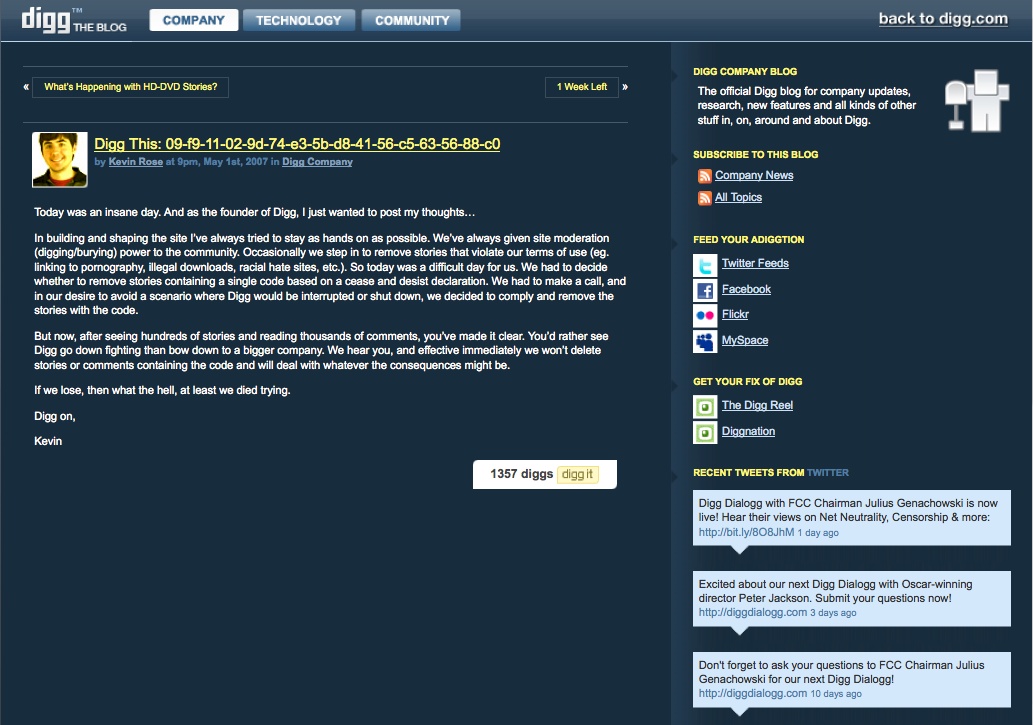Happy birthday, Digg: five years of the best and worst of the web
Highs and lows from Digg's first half-decade

Digg has achieved an incredible amount in a very short time: its 20-million-plus users can make or break stories, knock entire websites offline and, er, break into Bohemian Rhapsody for no good reason.
The original Digg was the result of three months work - "We started working on developing the site back in October 2004," founder Kevin Rose told ZDNet.
The site launched on 5 December 2004 with a simple, ad-free design by Dan Ries, but it really started cooking with gas in 2005.
That year brought Digg 2.0, friends lists, a brand new interface and the new Diggnation podcast, and things got better still in 2006 with the arrival of categories for technology, science, world and business news, videos, entertainment and gaming.
By that time Digg had become a very big deal, driving enormous amounts of traffic to any site featured on its front page. The numbers were so big that Jason Calacanis of the relaunched Netscape offered top Diggers cold hard cash if they jumped ship. Rose wasn't exactly impressed. "Think of what your loyal Netscape users must think," he responded. "You're essentially telling them that they aren't good enough and that you have to pay better users."
Spammers, scammers and copyright keys
Calacanis wasn't the only one to note Digg's power. In recent years there's been an ongoing battle between Digg and people who want to rig it, such as right-wing blogger Michelle Malkin, groups with particular political agendas and even mainstream publishers.
Get daily insight, inspiration and deals in your inbox
Sign up for breaking news, reviews, opinion, top tech deals, and more.
In 2008, Digg even had to get the lawyers in when one firm, Usocial.net, offered to pay Digg users to surreptitiously manipulate the site. The reason is simple enough: Diggs mean traffic.

DON'T RIG DIGG: Digg's popularity means it attracts unwelcome attention: Usocial.net (shown here) had to be threatened with legal action over its attempts to manipulate Digg
As Kevin Rose wrote at the height of the Digg gaming frenzy, such attempts are a sign of Digg's success: spammers and scammers are an on-going pain in the backside for Google, for Yahoo and any other site with serious numbers of users. "Besides the technology and algorithms we maintain, our strongest tool in this effort remains our community," Rose says.
"I'm constantly amazed and grateful to the 99.9% of our users who want to make Digg a better place by contributing great content, digging and burying stories, and alerting us to behaviour that seems out of the ordinary."
That doesn't mean the users necessarily do what Digg would like them to. In what Rose describes as "my scariest day at Digg" in 2007, Digg users posted the encryption key that protected the HD-DVD movie format - and they posted it again, and again, and again.
As Rose recalls, "We had people recording the code to music, putting it on YouTube and saying 'you can't take this down, it's just a song. That was my favourite; that and the people who took the digits and converted them into Klingon!"
Despite Digg's best efforts, they couldn't stop users from posting the code - so they stopped trying. As Rose wrote on Digg the Blog: "You've made it clear. You'd rather see Digg go down fighting than bow down to a bigger company. We hear you, and effective immediately we won't delete stories or comments containing the code and we will deal with whatever the consequences might be. If we lose, then what the hell, at least we died trying."
As if that wasn't remarkable enough, the New York Times report on the story described Digg users as "sophisticated Internet users".
Writer, broadcaster, musician and kitchen gadget obsessive Carrie Marshall has been writing about tech since 1998, contributing sage advice and odd opinions to all kinds of magazines and websites as well as writing more than a dozen books. Her memoir, Carrie Kills A Man, is on sale now and her next book, about pop music, is out in 2025. She is the singer in Glaswegian rock band Unquiet Mind.
